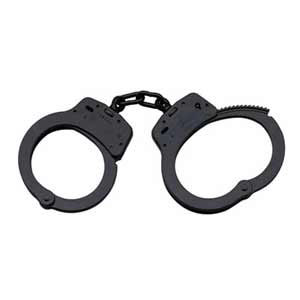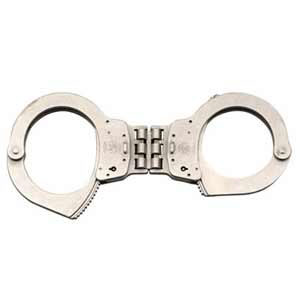Police Equipment and Supplies
JD Defense carries a complete line of police equipment and supplies. From holsers and duty belts to batons and handcuffs, we provide one place to shop for all law enforcemement officer neets. John (JD), a retired police officer, understands the needs and demanding requirement of law enforcement. That is why he only provides the highest quality gear available.
No matter if uniformed, plain clothes, or undercover, JD Defense carries what you need.
Do Handcuffs Matter?
Yes, they do! There are several critical factors to consider when purchasing handcuffs. The following excerpt is from Smith and Wesson and the reason why we specialize in Smith and Wesson handcuffs.
By Ralph Mroz
The use of force option that we use more (much, much more) than any other is handcuffing; we are handcuffing and un-cuffing people all the time. Consequently, use of force trainers remind us that proper technique and precautions when cuffing and UN-cuffing prisoners is one of our most important officer safety considerations. Notwithstanding those times we're happy just to get the cuffs on at all, that's good advice.
But what of the cuffs themselves? Do they make a difference? Are there really differences between all of the various cuffs and cuff types available?
Well…of course! After our radios and coffee mugs, our cuffs are probably our most used piece of professional equipment. The design and manufacture of anything that's used that often, and performs as vital a function as handcuffs do, is something to which we should pay attention.
Whether you prefer hinged or chained handcuffs (and many street-savvy officers carry one pair of each), the first thing to pay attention to is whether your cuffs meet NIJ  Standard 0307.01. This standard specifies that each handcuff shall be able to withstand a tensile force of 495 lbf without failure. The tested handcuff shall not open under load, shall not show any sign of permanent distortion or fracture and shall function in a normal manner following the test. The standard also specifies that each handcuff shall withstand 204 lbf/in for cheek plate separation. A majority of cheap handcuffs on the market don't meet this standard. Is this important? Well, consider how strong the last really big guy you arrested was, or consider the superhuman strength of a PCP user. Any cop who's worked the streets for a while knows of a local incident in which someone did, in fact, break their cuffs. So, yes, it's important-and why gamble?
Standard 0307.01. This standard specifies that each handcuff shall be able to withstand a tensile force of 495 lbf without failure. The tested handcuff shall not open under load, shall not show any sign of permanent distortion or fracture and shall function in a normal manner following the test. The standard also specifies that each handcuff shall withstand 204 lbf/in for cheek plate separation. A majority of cheap handcuffs on the market don't meet this standard. Is this important? Well, consider how strong the last really big guy you arrested was, or consider the superhuman strength of a PCP user. Any cop who's worked the streets for a while knows of a local incident in which someone did, in fact, break their cuffs. So, yes, it's important-and why gamble?
Next consider how your cuffs double-lock. Double locking cuffs once they are on a suspect is a vital thing to do…and one that's too often forgotten. Double-locking provides safety for the suspect in that the cuffs don't tighten and restrict circulation or lacerate him. More important, they provide safety for the officer in several ways:
- An unlocked set of cuffs are an invitation to a lawsuit for nerve damage or other more visible injuries
- An unlocked set of cuffs can be shimmed open-and too many of the really bad guys know how to do this
- Double-locked cuffs are more difficult to pick with a bent paper clip or similar object
- You won't be tempted to un-cuff your prisoner to adjust a "too tight" pair of cuffs and thus expose yourself to an assault.
There are two common methods for double-locking handcuffs. Some cuffs use a push pin mechanism, while Smith & Wesson cuffs have traditionally incorporated a slot-activated mechanism. Some officers prefer one method, while other officers prefer the other. It doesn't matter which mechanism you prefer or are comfortable with, so long as you remember to double-lock every time!
S&W has just announced four new models (and six variations) of pushpin activated double-locking handcuffs. Their chained Model 100 cuffs and hinged Model 300 are  now available with either a pushpin or slot-activated double locking mechanism. The new pushpin feature is available on both finish variations (blue or nickel) for the Model 100 (chained) and the Model 300 (hinged) handcuffs, as well as for the Model 103 (stainless steel) and Model 104 (high security) handcuffs (which incorporate a nonstandard key.) Smith and Wesson's groundbreaking Model 1 handcuffs-which accommodate both smaller and larger wrists than normal cuffs, and more ergonomically conform to a human wrist-already incorporate a pushpin lock. So now, whether you prefer chained or hinged cuffs, and whether you prefer a pin or a slot double-lock, it's available with S&W quality.
now available with either a pushpin or slot-activated double locking mechanism. The new pushpin feature is available on both finish variations (blue or nickel) for the Model 100 (chained) and the Model 300 (hinged) handcuffs, as well as for the Model 103 (stainless steel) and Model 104 (high security) handcuffs (which incorporate a nonstandard key.) Smith and Wesson's groundbreaking Model 1 handcuffs-which accommodate both smaller and larger wrists than normal cuffs, and more ergonomically conform to a human wrist-already incorporate a pushpin lock. So now, whether you prefer chained or hinged cuffs, and whether you prefer a pin or a slot double-lock, it's available with S&W quality.
Another consideration for handcuffs is how comfortable they are to use for the officer. Smith & Wesson handcuffs are contoured in such a way that holding them in the "loaded" position and applying them is noticeably more comfortable than handcuffs with a more square profile. A little thing, perhaps, but one that affects technique.
Smith & Wesson-through the Smith & Wesson Academy-is also the only manufacturer that offers accredited/recognized handcuff training. The Academy is a world-renowned institution, and their instruction is topnotch. Finally, Smith & Wesson can customize handcuffs to an agency's specifications, including customizing such things as chain length (a particularly attractive customization in a correctional setting) or mixing different types of cuffs.
So, no matter what your preferences or job requirements, Smith & Wesson has top-quality handcuffs for your application and JD Defense carries them.


